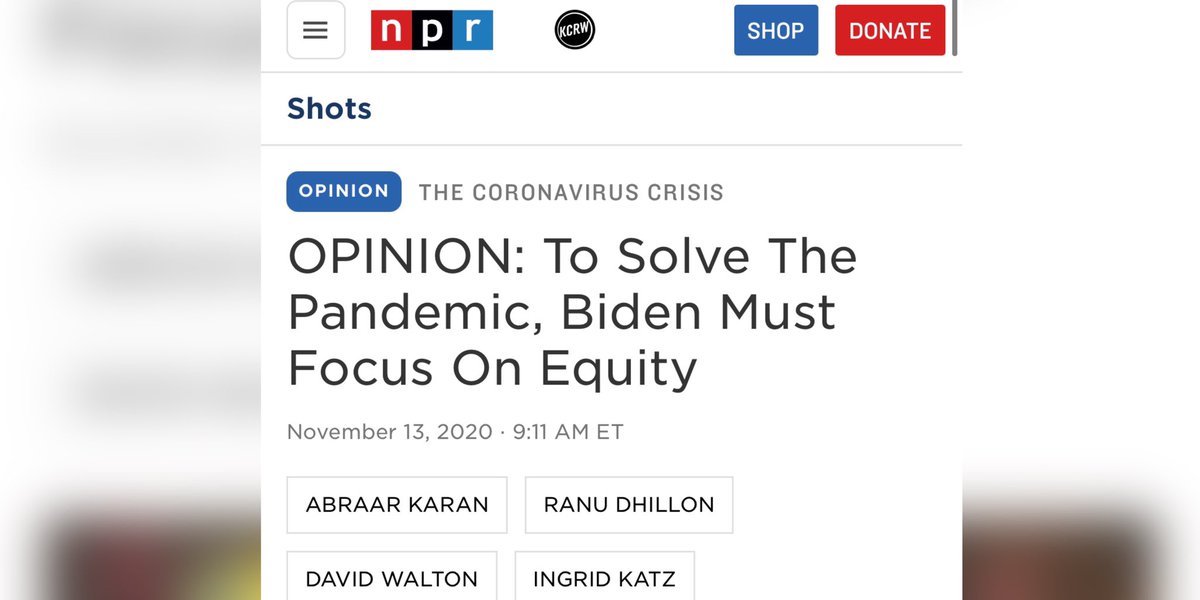
1/ It is *problematic* how quick people are to judge how other people may have been infected by #covid19.
This judgment re-enforces stigma; this is a destructive force that makes viral spread even more hidden.
This is *not helping*. It dissuades testing and disclosure.
This judgment re-enforces stigma; this is a destructive force that makes viral spread even more hidden.
This is *not helping*. It dissuades testing and disclosure.
2/ I am not trying to defend carelessness. But I am also not trying to be the judge of it. As doctors, we hear deep and personal stories. As much as I have had patients who got sick on the job, so too have I had patients destroyed by social isolation--> depression, alcoholism etc
3/ In this CDC report, 1 in 4 respondents aged 18 to 24 had *seriously considered suicide in the last 30 days*
Along with viral spread, there have been significant mental health epidemics as well.
We are all struggling in different ways.
cdc.gov/mmwr/volumes/6…
Along with viral spread, there have been significant mental health epidemics as well.
We are all struggling in different ways.
cdc.gov/mmwr/volumes/6…
4/ Trust me when I say I am hearing/seeing the other side of this; that our most vulnerable communities are being destroyed, having to work the frontline w/o protection.
I am aware of this; these are the patients we have been treating for months.
I am aware of this; these are the patients we have been treating for months.
5/ One must then ask if having empathy for those who got sick "socializing" rather than working is justified at all.
And others may go as far as to say that these privileged people deserve scorn or judgment, not empathy.
And others may go as far as to say that these privileged people deserve scorn or judgment, not empathy.
6/ But I would say that this way of thinking is probably not helpful.
This reminds me of medicine in important ways.
As doctors, we have to care for patients that we may have negative feelings toward; some may be racist, sexist, or discriminatory in some other way.
This reminds me of medicine in important ways.
As doctors, we have to care for patients that we may have negative feelings toward; some may be racist, sexist, or discriminatory in some other way.
7/ Yet we still must rely on empathy; if we don't, it becomes hard to be a good doctor.
Similarly, if we tap into judgment & anger more than we tap into empathy, forgiveness, & support, we will continue perpetuating stigma; losing chains of transmission & control of the epidemic
Similarly, if we tap into judgment & anger more than we tap into empathy, forgiveness, & support, we will continue perpetuating stigma; losing chains of transmission & control of the epidemic
8/ I am sure this thread will still get responses or reactions saying that privileged people don't deserve empathy; & I won't be able to change that, but as a doctor on the frontlines, I need to amplify the message that this judgment may not actually be helping us.
cc thread; have been trying to make sense of how to lean into empathy before we judge 'how' someone got infected
@JuliaLMarcus @gregggonsalves @RanuDhillon @nataliexdean @DrTomFrieden @edyong209 @zeynep @BhadeliaMD @syramadad @jabarocas @apoorva_nyc @alikhan28 @rajpanjabi
@JuliaLMarcus @gregggonsalves @RanuDhillon @nataliexdean @DrTomFrieden @edyong209 @zeynep @BhadeliaMD @syramadad @jabarocas @apoorva_nyc @alikhan28 @rajpanjabi
• • •
Missing some Tweet in this thread? You can try to
force a refresh



